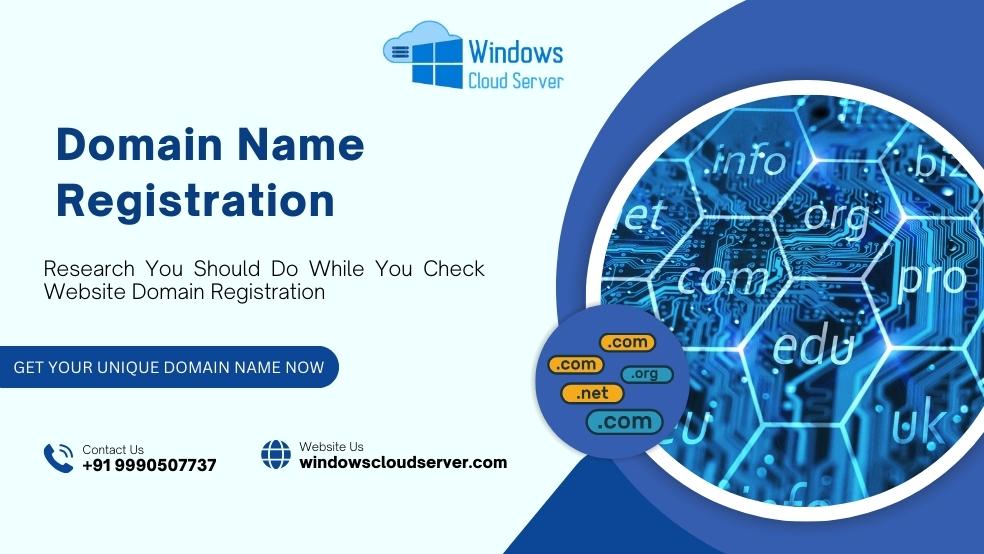This process involves more than just ensuring your desired domain name is available. To set a strong foundation for your online presence, you must conduct thorough research during the domain registration process. In this article, we will delve into the research you should do while you check website domain name registration, providing you with essential insights and guidelines to make informed decisions.
What is Domain Registration?
Before diving into the research aspect, let’s clarify what domain registration entails. Domain registration is the process of securing a unique web address (e.g., www.yourwebsite.com) for your website. This address serves as your online identity, allowing users to find and access your site on the internet. It’s important to note that domain names are subject to availability, and multiple websites cannot use the same domain.
Why is Research Essential?
1. Competitive Analysis: The online landscape is highly competitive. Researching your domain name helps you identify similar websites with comparable domain names. This allows you to differentiate yourself and avoid potential trademark conflicts.
2. SEO Considerations: Search engines consider domain names when ranking websites. A well-researched domain can positively impact your SEO efforts. Conversely, a poorly chosen domain may hinder your search engine visibility.
3. Brand Identity: Your domain name is an integral part of your brand identity. Research ensures that your chosen domain aligns with your brand’s values and goals.
4. Target Audience: It’s critical to comprehend who your target audience is. Research can help you select a domain name that resonates with your audience and is easy to remember.
Conducting Effective Research
1. Keyword Analysis
In the world of SEO (Search Engine Optimization), keywords are king. Your website’s visibility may increase if your domain name contains pertinent keywords. Find keyword phrases that are relevant to your industry and niche. To find high-performing keywords, use tools like Google Keyword Planner. Ensure that your domain name includes one or more of these keywords.
2. Domain Availability
Once you’ve identified potential domain names, check their availability using domain registrar websites like GoDaddy, Namecheap, or Google Domains. Ensure that the domain you choose is not already registered by someone else. If your desired domain is taken, you may need to consider alternative variations or extensions.
3. Trademark Checks
To avoid legal issues down the road, conduct trademark searches. Make sure that the domain name you choose does not conflict with any already-registered trademarks. Trademark conflicts can lead to costly legal battles and potentially force you to change your domain name.
4. Domain History
Investigate the history of a domain, especially if it’s a previously owned one. Some domains may have a history of spammy or unethical activities that can negatively impact your website’s reputation. Tools like the Wayback Machine can help you explore a domain’s past.
FAQs
Q: After registering a domain, can I change it?
A: Yes, you can change your domain name, but it’s a complex process. It’s advisable to choose a domain name carefully from the start to avoid the hassle of changing it later.
Q: Should I opt for a domain with my target keywords?
A: While it can be beneficial for SEO, it’s not mandatory. Focus on choosing a domain that reflects your brand and is easy to remember.
Q: What’s the typical cost of domain registration?
A: Domain registration costs vary, but our plans range from $5 to $45 per year, depending on the domain registrar and domain extension.
Q: Are there any restrictions on domain names?
A: Yes, there are rules and restrictions governing domain names, such as length limitations and the use of special characters. Be sure to check the registrar’s guidelines.
Q: Can I register a domain name forever?
A: Domain names are typically registered on an annual basis. However, you can usually register a domain for multiple years in advance.
Q: Is it necessary to have a domain that matches my business name?
A: While it’s not mandatory, having a domain name that aligns with your business name can enhance brand consistency.
Conclusion
In the digital age, your website’s domain name is more than just an address; it’s an integral part of your online identity and branding. Conducting thorough research during the domain registration process is essential to ensure your domain aligns with your brand, target audience, and SEO goals. By following the guidelines outlined in this article, you can make informed decisions and set a strong foundation for your online presence.

